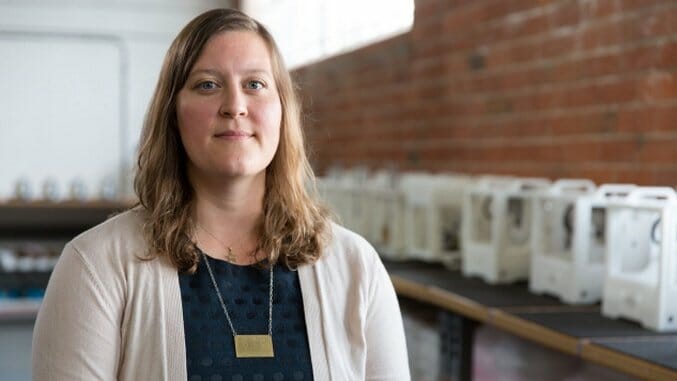How Danielle Applestone and Other Machine Co. are Fighting the Gender Gap and Bringing STEM Fields to Everyone

Women are underrepresented in STEM fields. While various initiatives have tried to change this, women are still less represented in certain science and engineering fields compared to men. The U.S. Bureau of Labor Statistics has determined that they comprise 39 percent of chemists and material scientists, 28 percent of environmental scientists and geoscientists, and a mere 16 percent of chemical engineers.
Such reasons are partly why Danielle Applestone stands out so significantly. As the CEO and cofounder of Other Machine Co., she’s developed the Othermill, a high-precision desktop CNC mill that aims to revolutionize manufacturing at various different levels. Impressively, half of her company is female, including engineers, bucking a common trend within the industry.
With the launch of the firm’s newest product — the Othermill Pro — last week, we talked to Applestone to find out about her passion for science, and to learn more about the issues facing women in technical fields.
“I always was driven to science and building things. I also loved to cook, bake and make jam. But every field has a huge wealth of ‘technical’ information, whether it is oil painting or music theory,” Applestone said. “There’s always another layer deeper and richer in any discipline. In my case, I grew up with the support of my family and teachers. There was never a question of whether or not I ‘should’ study engineering or rebuild engines though. I was just supported no matter what.”
Being around such a supportive network no doubt proved helpful as she worked her way up in the field.
 “I definitely had some struggles. Though, for me, as a tall and more physically-imposing woman, I feel like I’ve had it easier than many of my other female colleagues,” she said. “I am at peace with the fact that sometimes things are harder for us, and I don’t waste time wondering if I missed [an] opportunity due to my perceived gender.”
“I definitely had some struggles. Though, for me, as a tall and more physically-imposing woman, I feel like I’ve had it easier than many of my other female colleagues,” she said. “I am at peace with the fact that sometimes things are harder for us, and I don’t waste time wondering if I missed [an] opportunity due to my perceived gender.”
Before launching Other Machine Co., she ran a DARPA project to develop digital design software and manufacturing tools for the classroom. Once the funding ended, she took the technology and launched the firm.
As Applestone points out, it’s hard to raise money for any startup, especially a hardware startup, regardless of gender. She was comparatively lucky to have the support of her managers and bosses, but there were still issues of peers at work not being used to a woman asserting themselves. Something that she’s pleased to get past.
“It seems that women get involved in STEM subjects, and then they leave. They leave because the culture is oppressive and they don’t get enough support in the other aspects of their lives like family,” Applestone said. “Do I continue to go to work at this place that doesn’t respect my ideas or listen (and where I’m one of only 2% women), or do I stay at home and spend more time with my beautiful children? It just stops being worth it.”
It’s potentially a tricky discussion to have, but Applestone considers it something that needs to be talked about openly.
“The only way to improve things is to keep noticing, keep acknowledging the old patterns, and do a little bit every day to support the choices that women make – whether to stay in STEM or leave.”
-

-

-

-

-

-

-

-

-

-

-

-

-

-

-

-

-

-

-

-

-

-

-

-

-

-

-

-

-

-

-

-

-

-

-

-

-

-

-

-

 It’s not just something that relates solely to women, either. Men need to be given more choices in life, too.
It’s not just something that relates solely to women, either. Men need to be given more choices in life, too. The firm has just announced the Othermill Pro — a more advanced version of the conventional Othermill. While the original remains perfect for a classroom environment, the company learned it wasn’t quite right for more full-time professional use.
The firm has just announced the Othermill Pro — a more advanced version of the conventional Othermill. While the original remains perfect for a classroom environment, the company learned it wasn’t quite right for more full-time professional use.






































